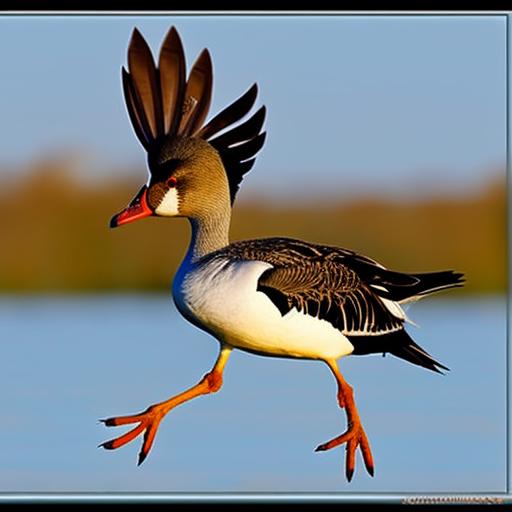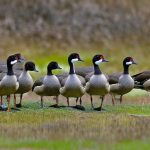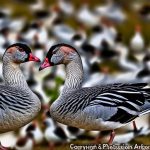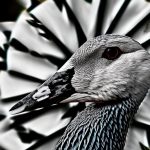Geese nesting has become a growing problem in many areas, causing damage to property and posing health risks. It is important to find humane solutions to this issue, as geese are protected under various laws and regulations. By understanding the nesting behavior of geese and implementing effective strategies, we can create a geese-free environment without causing harm to these birds.
Key Takeaways
- Geese are highly territorial and will aggressively defend their nesting sites.
- Physical barriers such as fences and netting can be effective in preventing geese from nesting.
- Creating an uninviting environment by removing food sources and reducing water access can discourage geese from nesting.
- Decoys and visual deterrents such as reflective tape and predator silhouettes can be used to scare geese away.
- Sound deterrents such as distress calls and predator noises can also be effective in deterring geese nesting.
Understanding the nesting behavior of geese
Geese are known for their strong nesting instincts and will often return to the same area year after year to nest. They typically choose areas near water, such as ponds, lakes, or rivers, as these provide a source of food and protection. Geese prefer open spaces with good visibility, allowing them to keep an eye out for predators.
Physical barriers to prevent geese nesting
One effective way to prevent geese nesting is by installing physical barriers. These barriers can include fences, netting, or even floating islands. Fences should be at least three feet high and have small mesh openings to prevent geese from squeezing through. Netting can be placed over areas where geese are likely to nest, such as lawns or gardens. Floating islands can be installed in bodies of water to provide an alternative nesting site for geese.
Creating an uninviting environment for geese
Another approach to preventing geese nesting is by creating an uninviting environment for them. This can be done by removing food sources that attract geese, such as grass clippings or fallen fruit. Changing the landscape by adding obstacles or dense vegetation can also discourage geese from nesting in certain areas.
The use of decoys and visual deterrents
Decoys and visual deterrents can be effective in deterring geese from nesting. Decoys can include life-sized replicas of predators, such as coyotes or owls, which can scare away geese. Visual deterrents, such as reflective tape or scare balloons, can also be effective in creating a sense of danger and discouraging geese from nesting.
The role of sound in deterring geese nesting

Sound deterrents can be used to further discourage geese from nesting. These can include devices that emit loud noises or predator calls. The sound of distress calls from other geese can also be effective in deterring nesting behavior.
The importance of regular maintenance and upkeep
Regular maintenance is crucial in maintaining a geese-free environment. This includes regularly checking and repairing physical barriers, removing any food sources that may attract geese, and ensuring that decoys and deterrents are in good working condition. By staying proactive and consistent with maintenance, the effectiveness of these strategies can be maximized.
The benefits of natural predators in controlling geese populations
Natural predators play an important role in controlling geese populations. Predators such as foxes, coyotes, or birds of prey can help keep geese numbers in check. By creating a habitat that attracts these natural predators, we can encourage a more balanced ecosystem and reduce the need for other control methods.
The use of repellents to discourage geese nesting
Repellents can be used to discourage geese from nesting in certain areas. These can include chemical repellents that make the area unappealing to geese or natural repellents such as garlic or chili pepper sprays. It is important to follow the instructions carefully when using repellents to ensure their effectiveness and minimize any potential harm to the environment.
The benefits of professional geese control services
In some cases, it may be necessary to seek professional geese control services. These professionals have the knowledge and experience to effectively manage geese populations while adhering to legal and ethical considerations. They can provide a range of services, including habitat modification, population management, and ongoing maintenance.
The importance of legal and ethical considerations in geese control
When implementing geese control measures, it is important to consider the legal and ethical implications. Geese are protected under various laws and regulations, and it is essential to ensure that any control methods used are in compliance with these regulations. Additionally, it is important to prioritize the well-being of the geese and minimize any harm or distress caused to them.
In conclusion, geese nesting can be a challenging problem, but there are humane solutions available. By understanding the nesting behavior of geese and implementing strategies such as physical barriers, creating an uninviting environment, using decoys and deterrents, utilizing sound deterrents, regular maintenance, attracting natural predators, using repellents, and seeking professional geese control services, we can effectively manage geese populations without causing harm. It is important to approach geese control in a responsible and ethical manner, considering the legal and ethical considerations involved. By taking action in a responsible way, we can create a geese-free environment while respecting the rights and well-being of these birds.
If you’re looking for ways to keep geese from nesting, you might also be interested in learning about the importance of providing a coop for turkeys. Poultry Wizard has a helpful article on whether turkeys need a coop, which can provide valuable insights into creating suitable living spaces for different types of poultry. Understanding the specific needs of turkeys can help you develop effective strategies for managing geese nesting issues. Check out the article here to gain a deeper understanding of coop requirements for turkeys and how it relates to your geese nesting concerns.
FAQs
What are some common problems caused by geese nesting?
Geese nesting can cause damage to property, create unsanitary conditions, and pose a safety risk to humans.
Why is it important to prevent geese from nesting?
Preventing geese from nesting can help reduce the negative impact they have on the environment and human health. It can also help prevent property damage and reduce the risk of accidents.
What are some effective ways to keep geese from nesting?
Some effective ways to keep geese from nesting include using decoys, installing barriers, using repellents, and removing nesting materials.
Are there any humane methods to prevent geese from nesting?
Yes, there are several humane methods to prevent geese from nesting, such as using decoys, installing barriers, and using repellents. It is important to avoid harming the geese or their eggs.
What should I do if geese have already nested on my property?
If geese have already nested on your property, it is important to contact a professional wildlife removal service to safely and humanely remove the geese and their eggs. It is illegal to disturb or harm nesting geese without a permit.
Meet Walter, the feathered-friend fanatic of Florida! Nestled in the sunshine state, Walter struts through life with his feathered companions, clucking his way to happiness. With a coop that’s fancier than a five-star hotel, he’s the Don Juan of the chicken world. When he’s not teaching his hens to do the cha-cha, you’ll find him in a heated debate with his prized rooster, Sir Clucks-a-Lot. Walter’s poultry passion is no yolk; he’s the sunny-side-up guy you never knew you needed in your flock of friends!







